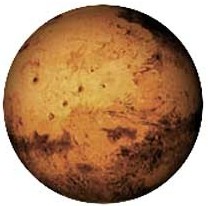Planet Mars Video Summary
Searching for signs of life on the Red Planet
by Holly Poulos
 Related Links |
Has there ever been life on the planet of Mars, or is life unique to the planet of Earth? The fundamental question scientists want to answer about the planet is whether any early life that exists or has existed on Mars is similar to the early life on Earth. Does life emerge generally, if the conditions are favorable, or does life take its own unique path and turn out differently?
Mars has been bombarded with satellites and landers, but many of the missions have failed. The Soviets had two Mars orbiters, while NASA created two Viking landers carrying complex laboratories, searching for microbial life. Their findings were inconclusive. Later missions to Mars also often failed, but when they did succeed, they were outstanding. Many of the robotic probes lasted for years. All the instruments sent to Mars have given us a much clearer picture of the planet and its history. The science was following the water: what happened to it, and where it is now.
The instruments sent to Mars have been able to tell us what kind of ice is currently on the planet. There's a mix of Carbon Dioxide (CO2) ice and water ice. It's important to characterize it this way, because scientists want to trace the existence of water on Mars in every form: liquid, solid, and water vapor. The findings showed researchers that there was water on Mars once, including rivers, lakes, and an ocean.
NASA constructed a new rover (Curiosity) to take advantage of the advances in robotic and computer technology. Engineers designed a system that would be very difficult to coordinate, including the Sky Crane, which spools out the rover on cables, to help it land on the surface of the planet. The Rover has been extremely successful. Curiosity roams the planet, drilling for samples and taking pictures, and sends images and data back to the scientists on earth. The rover is looking for the existence of life through the presence of microbial microorganisms.
